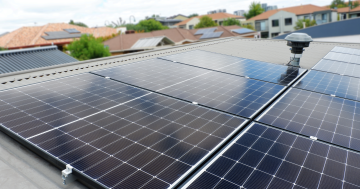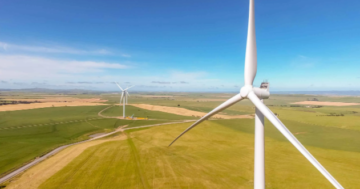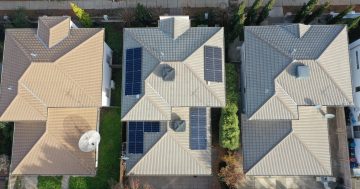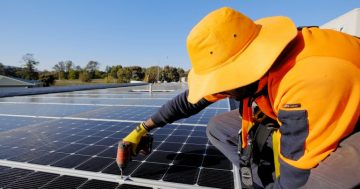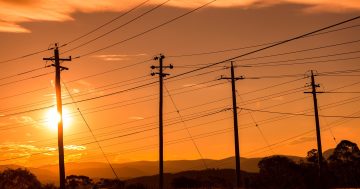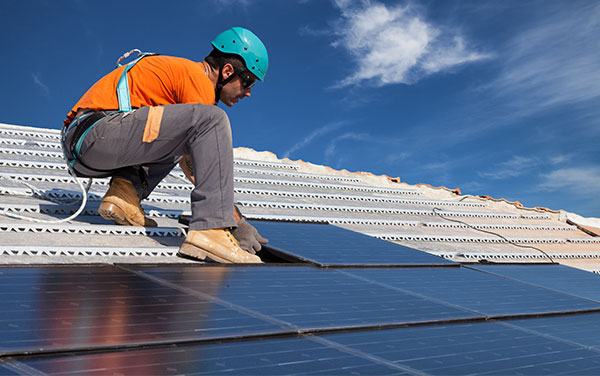
Rooftop solar has been very popular in Canberra, encouraged by the Feed-in Tariff Scheme. File photo.
A cloud of uncertainty is hanging over rooftop solar in the ACT with Government auditors called in to check the accuracy and reliability of Feed-in Tariff Scheme data reported by utility Evoenergy.
The audit will look at the ongoing reporting of the Small (houses) and Medium-scale FiT (warehouse size) schemes from July 2011 to June 2018, and the results will determine whether customers owe money or need to be refunded, although Evoenergy has said no customer will be out of pocket.
Climate Change Minister Shane Rattenbury said Government officials first raised concerns about the data in 2015 and had since been working with Evoenergy to sort out the issues, which go back 10 years.
“To enable the ACT Government to monitor the success of the scheme, it needs to have confidence in the data reported to us by the scheme administrator, Evoenergy,” Mr Rattenbury said.
“I have chosen to undertake this audit to ensure that the reported data is as accurate and complete as possible, and to ensure that Evoenergy’s information management and reporting processes are robust.
“The audit will ensure that the scheme continues to deliver for ACT consumers and provides the community with regular, accurate reports on the scheme’s progress and its contribution to the ACT’s energy supply.”
He said officials were reviewing the Electricity Feed-in (Renewable Energy Premium) Act 2008 and the audit was an opportunity help make any improvements.
Mr Rattenbury said Evoenergy was taking the matter seriously and had implemented a new data management system, and the audit would ensure it was doing its job properly.
He said the system had the capacity to even out over time but if there were adjustments to be made he did not expect any bill shocks for individual households, or large payouts to customers.
“If there has been some overcharging by Evoenergy that will refunded back to consumers in electricity bills in coming years,” Mr Rattenbury said.
An Environment directorate spokesperson said the ACT Government reported annually on the small and medium FiT scheme, and in compiling data for these reports, minor inconsistencies in the reported data were found, leading to periodic amendments to correct and update reported data. The audit process would seek to identify the specific problems that led to the inconsistencies in the data.
The audit would begin next month and the results were expected to be provided to the Minister in July. “While there is no requirement under the legislation to publish the audit findings, we anticipate publishing the audit findings on the Environment, Planning and Sustainable Development Directorate’s website,” the spokesperson said.
Evoenergy said in a statement that in 2017 it initiated a review of the way it collected and reported Feed-in Tariff data which found as data was migrated between its systems, additional checks were required to ensure the data was appropriately categorised (small, medium and large-scale generation) and also accurately captured the solar inverter make, model and capacity details.
“As a result of our review, we completed a data remediation project which included working closely with industry and customers to check and update the accuracy of source data,” it said.
Evoenergy said that all identified data issues had been resolved and it would ensure no customers were out of pocket as a result of previous data discrepancies.
“We welcome the ACT Government’s audit into our data remediation project and our related administration processes and look forward to receiving their final report in late 2019,” it said.
“We are committed to ensuring our data is managed effectively and will continue to identify opportunities to improve business and operations processes.”
Opposition Leader Alistair Coe had raised the data issues in the Legislative Assembly in March with a number of questions on notice.
The Government’s 20-year Feed-in Tariff Scheme closed in 2011 due to its popularity and subsequent cost, but Mr Rattenbury said it had done its job establishing a sustainable industry.
Evoenergy now pays customers 11 cents per kWh for any solar energy exported, if the system is less than 10 kilowatts for residential tariff customers and less than 30 kilowatts capacity for customers on business tariffs, but those who took up the Government scheme locked in a feed-in tariff of 45 cents.
Evoenergy is responsible for collecting and reporting on solar generation data that informs eligibility and payment of the feed-in tariff under the Feed-in Tariff Scheme.












